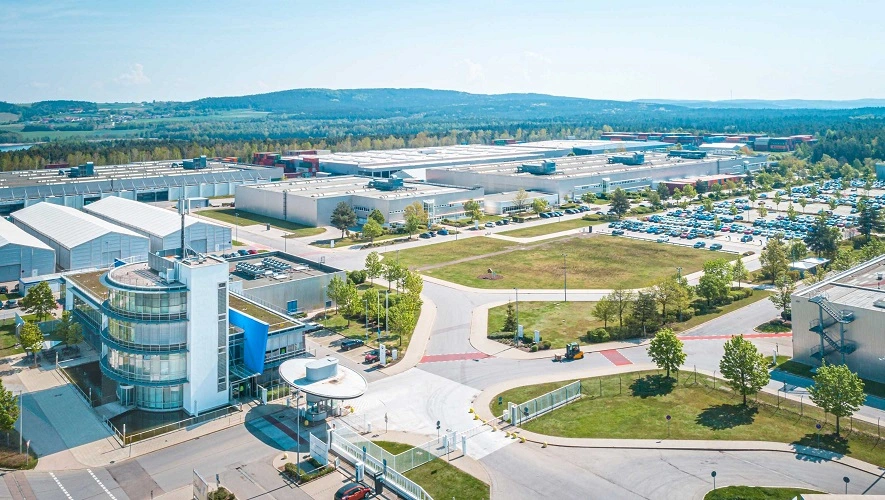In line with its commitment to the Wackersdorf site in the Upper Palatinate and as part of its dedication to electric mobility, BMW Group will invest approximately 100 million euros by 2026 in a new battery testing center.
The initial outcomes of BMW Group’s development activities in the high-voltage battery field will commence operation by mid-2024.
From then on, within a total area of 8,442 square meters, high-voltage batteries and other components of the electric propulsion system for future BMW Group models will be tested at a very early stage of development, well before production begins.
“The location of BMW Group in Wackersdorf will become a significant enabler for the transformation towards electromobility,” confirms site manager Christoph Peters, adding that the new battery testing center will expand the foundations of BMW Group’s facilities in Wackersdorf.
“In addition to supplying our foreign plants, cabin production, and, starting in 2024, door production for Rolls-Royce models, this will become Wackersdorf’s fourth main area of activity. This, in turn, strengthens the future viability of our location,” Peters adds.
The investment will primarily focus on the complex technology of test benches and the necessary infrastructure improvements to the existing building to make it operational.
Currently, Pavilion 80 on the factory premises is being renovated: this building, constructed in the 1980s for a reprocessing installation planned at that time, has a rich history.
“Now, this historic building will become a symbol of our plant’s electric future,” says Peters. Structural work is already underway, including the installation of a new floor slab for the building.
By mid-2024, with the commissioning of the first section, the so-called “battery testers” using the latest technology will come into operation.
Here, battery cells will be tested around the clock, from the early stages of their development.
The electrical performance of individual battery cells is determined during charging and discharging under different conditions.
This allows for simulating usage scenarios that will be relevant to customers much earlier than a vehicle in development hits the road.
Initially, it will be possible to conduct parallel testing of several hundred battery cells.
In the final phase, starting in 2025, the testing center will also be used to validate BMW Group’s battery electric vehicles before the official start of serial production and to ensure the required superior quality.
This includes subjecting the batteries to vibration and shock tests, for instance, using so-called “shakers,” highly complex testing devices of which there are currently only a few in all of Europe.
Endurance tests can also simulate complex driving patterns, including charge and discharge cycles. Tests like these are essential for the homologation of electric vehicles.
In some cases, specific country-specific tests must also be conducted.
The capacity for this type of testing in the open market is currently limited, so BMW Group is establishing its own capacity with the new battery testing center in Wackersdorf.”
BMW Group Plants Regensburg and Wackersdorf
The BMW Group has viewed itself for decades as the benchmark for production technology and operational excellence in vehicle construction – including at its locations in Regensburg and Wackersdorf.
The BMW Group vehicle plant in Regensburg has been in operation since 1986 and is one of more than 30 BMW Group production locations worldwide.
A total of up to 1,000 vehicles of the BMW 1 Series, BMW X1 and BMW X2 models come off the production line at Plant Regensburg every workday – destined for customers all over the world.
Different types of drive trains are flexibly manufactured on a single production line – from vehicles with internal combustion engines to plug-in hybrids, to fully-electric models.
High-voltage batteries for the electric models built in Regensburg are also produced locally, in direct proximity to the vehicle plant. They are assembled at the electric component production facility, which opened in 2021 at the Leibnizstrasse location.
BMW Innovation Park Wackersdorf also belongs to the Regensburg site. The 55-hectare campus built in the 1980s was originally intended as a nuclear reprocessing facility.
The BMW Group has located its cockpit production there, as well as its parts supply for overseas plants. In addition to BMW as the largest employer, several other companies are also based at Innovation Park Wackersdorf. A total of around 2,500 employees work there.
The BMW Group core staff at the Regensburg and Wackersdorf locations in eastern Bavaria is made up of around 9,000 employees, including more than 300 apprentices.







